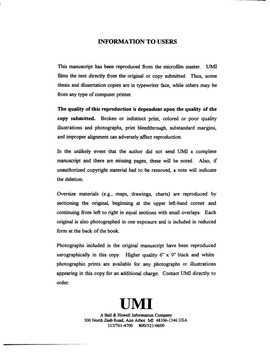| dc.contributor.advisor | Foster, Morris, | en_US |
| dc.contributor.author | Wallace, Pamela Smith. | en_US |
| dc.date.accessioned | 2013-08-16T12:30:22Z | |
| dc.date.available | 2013-08-16T12:30:22Z | |
| dc.date.issued | 1998 | en_US |
| dc.identifier.uri | https://hdl.handle.net/11244/5732 | |
| dc.description.abstract | From allotment to the current day, most scholars assume the various towns that originally formed the Creek polity have become assimilated into a single homogenous Creek culture. The Yuchi community has maintained a separate identity while being encapsulated within the Creek governmental structure for over two hundred years. Following removal, the Yuchi maintained identity and community cohesion through geographic locations and agrarian subsistence that allowed for daily face-to-face encounters among members, the Yuchi language, and long ritual sequences. The entrance of community members into the post-WWII wage-labor economy changed these forms of community interaction that had maintained cohesion since removal. | en_US |
| dc.description.abstract | This work is an ethnohistoric, ethnographic, and demographic analysis of the Yuchi (Euchee) Indian community during the latter half of the twentieth century. In this study, I will demonstrate how the Yuchi established interest group organizations for episodic political encounters with both Creek Nation and the United States government. Following WWII, these encounters brought the community together for decision making, but more importantly created venues to express and reinforce identity and cohesion. In the end, Yuchi mterest group organizations have become themselves symbols of Yuchi identity and community persistence. | en_US |
| dc.format.extent | xi, 498 leaves : | en_US |
| dc.subject | Sociology, Ethnic and Racial Studies. | en_US |
| dc.subject | Sociology, Demography. | en_US |
| dc.subject | Yuchi Indians Social life and customs. | en_US |
| dc.subject | Yuchi Indians 20th century. | en_US |
| dc.subject | Anthropology, Cultural. | en_US |
| dc.subject | Yuchi Indians. | en_US |
| dc.subject | Yuchi Indians Ethnic identity. | en_US |
| dc.subject | History, United States. | en_US |
| dc.title | Yuchi social history since World War II: Political symbolism in ethnic identity. | en_US |
| dc.type | Thesis | en_US |
| dc.thesis.degree | Ph.D. | en_US |
| dc.thesis.degreeDiscipline | Department of Anthropology | en_US |
| dc.note | Source: Dissertation Abstracts International, Volume: 59-11, Section: A, page: 4202. | en_US |
| dc.note | Adviser: Morris Foster. | en_US |
| ou.identifier | (UMI)AAI9911865 | en_US |
| ou.group | College of Arts and Sciences::Department of Anthropology | |
